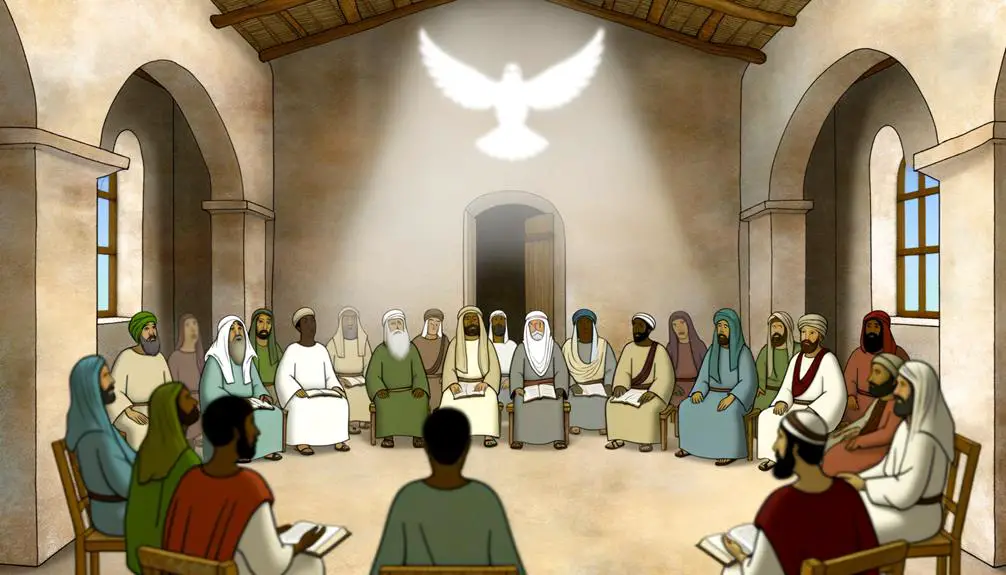Chart a transformative journey through the Bible in 15 weeks, uncovering timeless wisdom and mysteries that beckon for deeper exploration.

The Bible in 15 Weeks
Exploring the Bible in 15 weeks is like embarking on a journey through a vast and ancient landscape, where every turn reveals new vistas and hidden treasures. You'll start with the very foundations of existence in Genesis and travel through the rich tapestry of history, wisdom, prophecy, and revelation that has shaped not just religious thought but the very fabric of civilization.
As you progress, you'll uncover the interconnectedness of stories, laws, and parables that are as relevant today as they were thousands of years ago. The real intrigue lies not just in the familiar tales but in the subtle connections and insights you'll discover along the way, inviting you to question, reflect, and perhaps see the world through a slightly different lens.
Key Takeaways
- The Bible introduces core themes like covenant, divine justice, creation, and prophecy across various books and figures.
- Understanding biblical wisdom requires historical context, especially for interpreting prophecies and Jesus's teachings in 1st-century Palestine.
- Apostolic teachings emphasize unity, spiritual growth, and ethical living through faith, showcasing early Church challenges and resolutions.
- Applying biblical insights to modern challenges encourages personal growth, ethical decision-making, and community betterment.
Week 1: Genesis – Beginnings

In exploring the Book of Genesis, you'll delve into the origins of the universe, humanity, and the foundational narratives that shape the Judeo-Christian worldview. The text presents creation myths that are quintessential for understanding the early biblical perspective on the cosmos and human purpose. At the forefront is the portrayal of a deliberate and ordered creation by a singular deity, contrasting markedly with the often chaotic and multi-deity creations found in other ancient traditions.
Central to Genesis is the Garden of Eden narrative, symbolizing the ideal state of human existence and its subsequent loss. This story isn't merely an account of the first humans but serves as an archetype for the human condition, embodying themes of innocence, temptation, and the fall from grace. The detailed description of Eden and its significance is pivotal, offering deep insights into the human psyche and the perceived relationship between humanity and the divine.
Analyzing these texts, you'll notice that Genesis sets the stage for the entire biblical saga, establishing the covenant relationship between God and humanity. The creation myths and the Edenic narrative form the bedrock of this covenant, illustrating the expectations and failures that define this complex relationship. As you move through Genesis, keep in mind the intricate layers of symbolism and meaning that these stories convey. They're not just ancient texts but are imbued with perennial questions about morality, purpose, and the very nature of existence itself.
Week 2: Exodus to Deuteronomy – The Law

Transitioning from the foundational narratives of Genesis, you'll now encounter the intricate laws and moral directives that define Exodus through Deuteronomy, collectively shaping the Judeo-Christian ethical framework. This segment of scripture not only recounts Israel's liberation from Egypt but also details the establishment of a covenantal relationship between God and His chosen people, marked by the giving of the Law at Sinai.
As you delve into these texts, you'll uncover:
- The significance of covenant renewal ceremonies, which not only reaffirmed Israel's commitment to Yahweh but also served as pivotal moments for communal identity and continuity.
- The detailed Tabernacle construction instructions, symbolizing God's presence among His people and the seriousness of approaching Him in worship.
- The meticulous Levitical laws, which governed not just religious observance but every aspect of daily life, reflecting a holistic understanding of holiness.
- The blessings and curses associated with the covenant, highlighting the conditional nature of Israel's relationship with God, predicated on obedience.
Analyzing these books reveals a complex interplay between divine sovereignty and human responsibility. The laws given aren't arbitrary but are designed to set Israel apart as a holy nation, a light to the surrounding nations. The narratives of Exodus through Deuteronomy emphasize that God's intention was always to dwell among His people, guiding them towards a way of life that reflects His character.
Understanding this segment of scripture is crucial for grasping the full narrative arc of the Bible, as it sets the stage for Israel's historical and prophetic journey, underpinning the entire Judeo-Christian ethical and moral system.
Week 3: Joshua to Esther – History of Israel

You'll observe that Joshua's leadership transition marks a pivotal shift in Israel's history, underscoring the move from nomadic life to settlement in Canaan.
The era of kings and prophets introduces a complex interplay between divine guidance and human governance, highlighting the tensions that lead to both unity and division within the nation.
Lastly, the narrative of exile and return not only reflects the physical journey of the Israelites but also symbolizes their spiritual resilience and restoration.
Joshua's Leadership Transition
Joshua's ascent to leadership marks a pivotal shift in Israelite history, embodying both continuity and transformation within their communal identity. As you delve into this transition, you'll encounter:
- Joshua's adept use of military strategies, ensuring the Israelites' successful settlement in Canaan.
- The crucial act of covenant renewal at Mount Ebal, signifying a reaffirmation of Israel's faith and commitment.
- Innovative leadership approaches that balanced traditional values with the necessities of conquering and settling a new land.
- The establishment of a centralized leadership model under Joshua, contrasting with the previously tribal-centric governance.
This phase in the Israelite narrative showcases how Joshua's leadership wasn't merely a continuation of Moses' legacy but also a period of significant evolution, laying foundational principles for the nation's future.
Kings and Prophets
As we explore the era of Kings and Prophets, it's crucial to understand how this period shaped Israel's socio-political and religious landscape, fundamentally altering its trajectory.
The construction of the Temple under King Solomon wasn't just an architectural feat; it symbolized a centralized worship and political power, marking a pivotal moment in Jewish identity.
Yet, this era wasn't without its challenges. Prophet controversies, often stemming from their critiques of royal and societal injustices, underscored a tension between divine commandments and human governance.
These prophets didn't merely predict the future; they called for repentance, social justice, and adherence to covenantal obligations. Their voices added a complex layer to the narrative, illustrating the dynamic interplay between divine instruction and human agency during this transformative period in Israel's history.
Exile and Return
Why did the period of Exile and Return become a crucible for the transformation of Jewish faith and identity? This era, marked by profound shifts under Cyrus's decree and the rebuilding of Nehemiah's wall, was pivotal. Here's why:
- Cyrus's decree allowed exiles to return, rekindling a national identity.
- The construction of Nehemiah's wall symbolized a physical and spiritual renewal.
- This period fostered a reevaluation of covenantal faith amidst foreign rule.
- It catalyzed the compilation and canonization of sacred texts, ensuring the preservation of traditions.
These elements were fundamental in redefining Jewish community, faith, and practice, solidifying a collective identity that persisted through adversity.
Week 4: Job to Song of Solomon – Wisdom Literature

As you explore Week 4's focus on Wisdom Literature from Job to Song of Solomon, you'll encounter Job's unwavering faith amidst profound suffering and the practical guidance of Proverbs for leading a virtuous life.
These texts offer rich insights into the complexity of human experience, juxtaposing the endurance of the human spirit with the pursuit of ethical living.
Analyzing these books reveals not only ancient philosophical perspectives but also timeless lessons on resilience and moral integrity.
Job's Enduring Faith
Job's unwavering faith, amidst his profound suffering, stands as a testament to the enduring power of belief in the face of inexplicable adversity. Job's story, deeply embedded in the Wisdom Literature, offers a profound exploration of Job's patience and the elusive purpose behind suffering. This narrative invites you to delve into the depths of faith tested by the severest of life's trials.
- Job's response to loss and pain reveals a multifaceted relationship with faith and doubt.
- The dialogue between Job and his friends showcases the complexity of interpreting suffering's purpose.
- God's eventual response to Job underscores the limitations of human understanding.
- The restoration of Job's fortunes serves as a contentious point for interpretations of divine justice and reward.
Analyzing Job's enduring faith provides insightful reflections on the nature of belief and resilience in the face of adversity.
Proverbs' Life Lessons
Delving into the book of Proverbs unveils timeless wisdom that guides daily living and moral decision-making, presenting a compendium of life lessons that remain profoundly relevant in contemporary society. Within its verses, wisdom isn't merely an abstract concept but is personified, offering counsel as a mentor might, navigating individuals through life's complexities. This personification of wisdom serves to bridge the gap between divine guidance and practical application, making these teachings accessible and actionable.
Furthermore, the emphasis on financial prudence underscores a nuanced understanding of wealth management and economic responsibility. Proverbs doesn't just advocate for hard work but encourages a discerning approach to financial stewardship, highlighting the virtues of saving, investing wisely, and the perils of reckless spending. Through this lens, the book offers a blueprint for not only moral but also fiscal integrity.
Week 5: Isaiah to Daniel – Major Prophets

Exploring the writings of Isaiah to Daniel reveals the profound insights and prophecies of the Major Prophets, pivotal figures in biblical literature whose messages resonate with themes of judgment, redemption, and hope. As you delve into this crucial segment of the Bible, you'll uncover the layers of meaning behind Isaiah's prophecies and Daniel's visions, each offering a unique lens through which to view the unfolding of divine plans for humanity.
In understanding the depth of these books, consider the following:
- Isaiah's Prophecies: Isaiah's messages are a complex blend of judgment and salvation. His prophecies foresee the coming of the Messiah, a savior who embodies hope amidst despair. Isaiah's vivid imagery and poetic language enrich his foretellings, making them a cornerstone of prophetic literature.
- Daniel's Visions: Daniel's apocalyptic visions provide a glimpse into the end times, marked by symbolic beasts and celestial battles. These visions extend beyond immediate historical contexts to offer insights into God's ultimate sovereignty over history and empires.
- Themes of Redemption: Both Isaiah and Daniel emphasize a future where God redeems His people, painting pictures of restoration and new beginnings. This theme is central to understanding the heart of God's message through the prophets.
- Historical and Cultural Context: The backdrop of political upheaval and exile during these prophets' lives adds a layer of urgency and authenticity to their messages. Understanding the historical context enriches your comprehension of their prophecies.
As you explore the writings from Isaiah to Daniel, you're invited into a world where divine messages transcend time, offering wisdom and insight for both ancient and modern readers.
Week 6: Hosea to Malachi – Minor Prophets

As you explore the Minor Prophets from Hosea to Malachi, you'll uncover the layers of prophetic messages that are intricately woven with historical events and societal dynamics of their times.
These books offer a nuanced understanding of divine communication, revealing how warnings, promises, and calls for repentance were tailored to the specific contexts and needs of the people.
Analyzing these texts, you'll appreciate the complexity of interpreting divine messages within their historical milieu, enhancing your comprehension of biblical prophecy's role in ancient Israelite society.
Prophetic Messages Explored
In week six, we turn our attention to the Minor Prophets, from Hosea to Malachi, whose messages, though compact, offer profound insights into the social, ethical, and spiritual challenges of their times. Their narratives hold significant Modern relevancy, shedding light on how Cultural interpretations have evolved.
- Hosea's narrative: Symbolizes unfaithfulness but emphasizes forgiveness, mirroring societal issues of betrayal and reconciliation.
- Micah's justice call: Advocates for social justice, reflecting contemporary concerns over inequality and advocacy.
- Habakkuk's dialogue with God: Questions divine justice, providing a framework for modern existential and theological debates.
- Malachi's emphasis on faithfulness: Addresses lax religious practices, paralleling modern discussions on spiritual integrity and authenticity.
These prophets, through their timeless messages, invite a reevaluation of ethical and spiritual values in today's context.
Historical Context Unveiled
Having examined the prophetic messages of Hosea to Malachi for their modern relevance, let's now uncover the historical context that shaped these profound narratives. Archaeological evidence and cultural influences deeply inform our understanding of these texts, illuminating the societal and political climates these prophets addressed.
Aspect |
Impact |
|---|---|
Archaeological Discoveries |
Reveals the material culture, confirming the historical accuracy of events and practices mentioned. |
Political Turmoil |
Contextualizes the prophets' messages against a backdrop of upheaval, leading to a deeper emotional connection. |
Cultural Practices |
Highlights the divergence and convergence with neighboring cultures, influencing the prophets' critiques. |
Economic Conditions |
Sheds light on social injustices highlighted by the prophets, stoking empathy and understanding. |
This analysis reveals how deeply intertwined these narratives are with their historical moment, offering a richer, more nuanced understanding.
Week 7: The Gospels – Life of Jesus

Exploring the Gospels reveals the multifaceted life of Jesus, encompassing his teachings, miracles, and unparalleled impact on humanity. As you delve deeper into the narratives of Matthew, Mark, Luke, and John, you'll uncover a rich tapestry of events that not only shaped the course of history but also offer profound insights for personal reflection. The Gospels serve as both a historical account and a spiritual guide, presenting Jesus's journey through a lens that's both intimate and revolutionary.
To keep you engaged and help you grasp the essence of Jesus's life as depicted in the Gospels, consider the following key aspects:
- Miracle analysis: Each miracle performed by Jesus, from turning water into wine to the raising of Lazarus, carries with it layers of meaning that go beyond the surface. These acts aren't merely displays of divine power but are also rich in symbolism, offering insights into Jesus's nature and mission.
- Parable interpretations: Jesus's use of parables as a teaching tool is unparalleled. These simple stories, laden with deep spiritual truths, challenge conventional wisdom and invite listeners to explore the kingdom of God from a fresh perspective.
- Ethical teachings and social implications: Jesus's teachings on love, forgiveness, and justice weren't just revolutionary; they were radical for the time, challenging social norms and setting a new standard for ethical conduct.
- Historical context and its impact on Jesus's message: Understanding the political, social, and religious backdrop of 1st-century Palestine is crucial for appreciating the relevance and radical nature of Jesus's teachings and actions.
Week 8: Acts of the Apostles – The Early Church

In Week 8, you'll explore the transformative period of the early Church, as chronicled in the Acts of the Apostles. The focus will be on Apostolic Miracles Unfolded and Persecution and Unity. You'll analyze how the apostles' miraculous works not only affirmed their divine mandate but also served as a catalyst for both growth and conflict within and outside the nascent church.
Additionally, the nuanced interplay between persecution and the burgeoning sense of unity among believers provides critical insights into the dynamics that shaped the early Christian community.
Apostolic Miracles Unfolded
As you delve into Week 8, 'Apostolic Miracles Unfolded' reveals the transformative power and divine intervention marking the early days of the Church, as chronicled in the Acts of the Apostles. This period is illuminated by the Pentecost event, where spiritual gifts are bestowed upon the apostles, enabling them to perform miracles and spread the Gospel with unprecedented authority and zeal.
- Pentecost Event: A pivotal moment where the Holy Spirit empowers the apostles.
- Healing Miracles: Demonstrating Christ's compassion and power through the apostles.
- Speaking in Tongues: A sign of divine presence and a tool for universal Gospel proclamation.
- Community Formation: Miracles foster unity and growth among the early believers.
These elements underscore the miraculous, setting a foundation for the burgeoning Church amidst trials and triumphs.
Persecution and Unity
The Acts of the Apostles documents how persecution galvanized the early Church, fostering an unprecedented unity among believers. This period was marked by intense challenges, including Christian martyrdom, which served as a catalyst for spiritual resilience among the faithful.
Rather than succumbing to fear or division, the early Christians' shared experiences of adversity strengthened their communal bonds and commitment to their faith. Through these trials, they developed a profound sense of identity and solidarity, laying the foundation for a robust and enduring Church.
This unity wasn't merely a byproduct of external pressures; it was a deliberate response, rooted in a deep conviction of their shared mission and the transformative power of their collective witness.
Week 9: Romans to Galatians – Paul's Theology

Delving into Paul's theology from Romans to Galatians reveals his nuanced understanding of faith, law, and grace as foundational to Christian belief. Through his letters, you uncover how Paul's missionary journeys significantly shaped his theological reflections, particularly around the concept of justification by faith. This principle asserts that faith in Jesus Christ, rather than adherence to the Law, is what justifies a person before God. Paul's argument is deeply rooted in his own experiences and the communities he encountered, showcasing a profound dialogue between diverse religious traditions and the emerging Christian faith.
To keep you engaged, consider these key points in Paul's theology:
- Justification by Faith: Paul passionately argues that faith in Christ, not the works of the Law, grants righteousness before God.
- The Role of the Law: He navigates the complex role of the Law in Christianity, viewing it as a guide that ultimately leads to Christ.
- Universal Salvation: Paul emphasizes that salvation is available to all, Jew and Gentile alike, through faith in Jesus Christ.
- Life in the Spirit: He introduces the concept of living according to the Spirit, contrasting it with living under the Law.
Paul's theological framework in these letters is both revolutionary and foundational, challenging early Christians and modern readers alike to reconsider the essence of faith, grace, and the nature of God's salvation. His insights from Romans to Galatians provide a critical cornerstone for Christian theology, encouraging deep reflection on the relationship between faith, law, and grace.
Week 10: Ephesians to Philemon – Letters to the Church

Transitioning to Ephesians through Philemon, you'll explore Paul's nuanced guidance for the early Christian communities, emphasizing unity, love, and ethical living in the body of Christ. These letters, rich with theological insights and practical advice, delve into the heart of Christian unity and the challenges of maintaining it amidst diverse backgrounds and beliefs.
In Ephesians, you're introduced to the concept of the Church as the body of Christ, a foundational metaphor that underscores the interconnectedness of believers. Paul's exhortation to 'put on the full armor of God' isn't just a call to individual spiritual resilience but a communal directive. The spiritual armor—comprising truth, righteousness, the gospel of peace, faith, salvation, and the Word of God—serves as both protection and unification for the Christian community against spiritual adversities.
The theme of unity is further elaborated in Philippians, where Paul appeals for humility and likemindedness, echoing Christ's own humility. This call to emulate Christ's attitude isn't merely ethical but deeply theological, grounding Christian behavior in the very nature of God revealed in Jesus.
Colossians continues this thread by emphasizing the supremacy of Christ and the completeness believers find in Him, which transcends cultural and religious boundaries, thereby fostering unity.
Lastly, Philemon offers a personal but profound exploration of Christian brotherhood, urging reconciliation and mutual respect among believers, regardless of social status.
Through these letters, Paul's theology of the Church as a unified body in Christ becomes vivid. He doesn't just advocate for theoretical unity but provides concrete practices for living out this unity, rooted in love and mutual submission, thereby embodying the ethical life of the Christian community.
Week 11: Hebrews to Jude – General Epistles

Building on Paul's letters, we now explore the General Epistles from Hebrews to Jude, which further illuminate the early Christian experience with rich theological insights and practical guidance for faith communities. These letters, while varied in authorship and audience, share a common thread in emphasizing faith endurance and spiritual maturity. They offer a nuanced understanding of the complexities faced by early believers and provide timeless wisdom for today's faithful.
- Hebrews: This epistle stands out for its high Christology, presenting Jesus as the supreme mediator of God's new covenant. It underscores the necessity of faith endurance, using the imagery of Jesus as both the high priest and the ultimate sacrifice to encourage believers to persevere in their faith amidst trials.
- James: Focused on practical Christianity, James challenges believers to demonstrate their faith through works, highlighting the link between faith and deeds. It speaks directly to the need for spiritual maturity, urging readers to live out their faith authentically.
- Peter's Letters: These letters offer solace and instruction to suffering Christians, emphasizing the importance of standing firm in faith despite persecution. Peter encourages a holy life as a testimony of one's faith, underscoring the growth toward spiritual maturity through suffering.
- Jude: Although brief, Jude packs a powerful message against complacency and false teachings, urging believers to contend for the faith handed down to them and to build themselves up in their most holy faith.
These General Epistles collectively serve as a bridge, encouraging believers to transition from initial faith to deeper spiritual maturity, emphasizing the integral role of faith endurance in the Christian journey.
Week 12: Revelation – Apocalyptic Visions

Venturing into the final book of the New Testament, Revelation presents a complex tapestry of apocalyptic visions that challenge and inspire the reader's understanding of the end times. Authored by John, this enigmatic book is rich with end times prophecies and symbolic imagery, designed not only to reveal the ultimate victory of good over evil but also to offer hope to the faithful in times of persecution.
At its core, Revelation employs a plethora of symbolic imagery that demands careful interpretation. Symbols like the Beast, the Lamb, and the Dragon aren't merely characters but are imbued with deep theological significance, representing various entities and concepts within Christian eschatology. The use of numbers, colors, and scenarios within these visions further layers the text with meaning, each carefully chosen to communicate specific aspects of the prophecy.
The book's structure itself is a carefully crafted narrative, beginning with letters to seven churches in Asia Minor, which serve not only as a direct message to these communities but also as a representation of the universal church's challenges through the ages. This is followed by visions of heavenly worship, the breaking of seals leading to judgments, and the final battle between good and evil, culminating in a new heaven and a new earth.
Understanding Revelation's apocalyptic visions requires a grasp of its historical context, the Old Testament prophecies it references, and the symbolic language it employs. It's a book that serves as both a warning and a promise, encouraging steadfastness in faith amid trials, with the assurance of divine justice and ultimate redemption.
Week 13: Key Themes in the Old Testament

After exploring the complex apocalyptic visions of Revelation, we now turn our attention to the foundational themes permeating the Old Testament, offering insights into the beliefs, laws, and historical narratives that shape the bedrock of Christian theology. The Old Testament isn't just a precursor to the New Testament; it's a rich tapestry that introduces and develops themes critical to understanding the entirety of Biblical scripture.
Key themes include:
- Covenant Relationship: At the heart of the Old Testament is the concept of a covenant relationship between God and His people. This theme is a golden thread that runs through the narratives, starting with Abraham and extending through Moses to David. It's a relationship based on promises, obligations, and divine fidelity, highlighting the personal and communal aspects of faith.
- Divine Justice: The Old Testament frequently addresses the concept of divine justice, illustrating how righteousness and justice are integral to God's character. This theme is evident in the laws given to Moses, the prophetic calls to social justice, and the narratives of reward and punishment.
- Creation and Humanity: From the creation narratives in Genesis, the Old Testament explores the relationship between God, humanity, and the world. This theme underscores humanity's stewardship role and the intrinsic value of the created order.
- Prophetic Calls to Repentance: The prophets play a crucial role in calling God's people back to faithfulness and adherence to the covenant. Their messages, though sometimes harsh, are grounded in hope for redemption and restoration.
Analyzing these themes offers deep insights into the Old Testament's contribution to Christian theology, emphasizing the continuity and depth of the Biblical narrative.
Week 14: Key Themes in the New Testament

How does the New Testament continue and expand upon the foundational themes introduced in the Old Testament, particularly in the context of the life and teachings of Jesus Christ? The New Testament shifts its emphasis towards grace, redemption, and the fulfillment of messianic prophecies, centering around the figure of Jesus Christ. It's a complex, rich tapestry that weaves together centuries of expectations with the reality of Christ's life and teachings, offering a profound exploration of themes like grace, love, and salvation.
Theme |
Old Testament Foundation |
New Testament Expansion |
|---|---|---|
Grace |
God's favor to Israel |
Universal grace through Jesus |
Covenant |
Abraham, Moses |
New Covenant through Jesus' sacrifice |
Kingdom of God |
Davidic reign |
Spiritual kingdom in Christ |
Messianic Fulfillment |
Prophecies of a savior |
Jesus as the promised Messiah |
The grace concept is particularly transformative. Where the Old Testament presents grace through God's covenants with His chosen people, the New Testament opens this grace to all humanity through faith in Christ. This marks a significant shift from a more exclusive understanding of God's favor to a universally accessible salvation.
Messianic fulfillment, too, is central. The New Testament meticulously ties Jesus' life and works to Old Testament prophecies, presenting Him as the long-awaited Messiah. This not only validates Jesus' role but also serves as a bridge connecting both Testaments, reinforcing the continuity of God's plan for humanity.
These key themes underscore the New Testament's role in elucidating and expanding upon the theological and moral groundwork laid in the Old Testament, centered around the pivotal figure of Jesus Christ.
Week 15: Applying Biblical Wisdom Today

In today's rapidly evolving society, you'll find that the wisdom contained within the Bible remains remarkably relevant, offering profound insights into personal conduct, community relations, and ethical dilemmas. The modern application of biblical principles may seem daunting at first, given the historical and cultural distance. Yet, a closer examination reveals that these ancient texts continue to illuminate the path through today's complex ethical dilemmas.
- Navigating Ethical Dilemmas: The Bible's narratives and teachings provide a moral compass, guiding individuals through the murky waters of contemporary ethical challenges.
- Enhancing Personal Conduct: Biblical wisdom emphasizes virtues such as patience, humility, and integrity, which are indispensable for personal growth and interpersonal relationships in the 21st century.
- Strengthening Community Relations: Through principles of love, forgiveness, and charity, the Bible offers timeless strategies for building resilient and harmonious communities.
- Promoting Social Justice: Scriptural teachings on compassion and equity inspire efforts towards rectifying injustices and advocating for the marginalized in today's societies.
The application of biblical wisdom in modern contexts requires discernment and an understanding of the underlying ethical principles rather than a literalist approach. It's about extracting the essence of the teachings and applying them to contemporary situations, from personal decisions to global issues. This approach not only enriches individual lives but also contributes to the moral and ethical fabric of society. As you grapple with modern ethical dilemmas, let the timeless wisdom of the Bible serve as both anchor and compass, guiding your choices and actions in a rapidly changing world.
Frequently Asked Questions
How Do Different Christian Denominations Interpret the Concept of the Trinity, and Where in the Bible Can These Interpretations Be Supported?
You're diving into how Christian denominations parse the Trinity's origins, sparking denominational debates. Each group reads Bible passages to back their views.
For instance, Catholics see the Trinity in Matthew 28:19, while Baptists might emphasize passages like Acts 2:38 for a slightly different understanding.
This analysis isn't just theological—it's about how scripture's interpretation informs faith, revealing the depth and diversity within Christianity's approach to understanding one of its core doctrines.
What Are the Main Archaeological Findings That Support or Contradict the Historical Events Described in the Bible?
Diving into history's depths, you'll find the Dead Sea Scrolls and Jericho excavation as cornerstones that either anchor or drift the biblical narratives in reality.
The Dead Sea Scrolls, a treasure trove of ancient texts, lend credence to the accuracy of biblical manuscripts.
Meanwhile, debates around Jericho's excavation challenge the timing and nature of events described.
Analytically, these findings offer a nuanced view, supporting some historical claims while questioning others.
How Has the Translation of the Bible Into Various Languages Over the Centuries Affected the Interpretation of Its Texts, Especially Concerning Controversial or Ambiguous Passages?
When the Bible's been translated into various languages, translation accuracy and cultural impacts have significantly shaped the interpretation of its texts. This is especially true for controversial or ambiguous passages.
You'll find that nuances in language and cultural context can alter meanings, leading to diverse understandings and practices among faith communities. This phenomenon underscores the complexity of conveying ancient spiritual texts across different eras and cultures, affecting how you perceive and apply biblical teachings today.
In What Ways Have Modern Scientific Discoveries and Theories, Such as the Big Bang and Evolution, Been Reconciled With or Challenged the Narratives Found in Genesis?
You're navigating a cosmic quest, where the Big Bang and evolution challenge Genesis' narratives. Modern science, with its cosmic microwave background evidence, pushes you to ponder creation's timeline.
Meanwhile, genetic diversity intricacies question Adam and Eve's sole ancestry. Yet, some reconcile these views, seeing science and scripture as complementary, not conflicting.
This analytical journey demands scrutinizing both ancient texts and cutting-edge discoveries, urging a nuanced understanding of faith and science.
How Do Biblical Principles of Leadership and Governance as Presented in the Bible Influence Contemporary Political Thought and Policy-Making, Especially in Predominantly Christian Countries?
In contemporary political thought and policy-making, especially within predominantly Christian nations, you'll find biblical principles of leadership and governance deeply influencing decisions. Ethical leadership, drawn from biblical teachings, emphasizes integrity and accountability, shaping leaders' approaches.
Similarly, charity models inspired by the Bible encourage policies that support the vulnerable in society. These principles guide politicians and lawmakers, intertwining faith with governance to address societal needs while upholding moral values.
Conclusion
As you've journeyed through the biblical landscape over 15 weeks, you've navigated the origins, laws, histories, and prophecies that form its vast terrain. Like a sojourner deciphering ancient maps, you've uncovered the allegorical mountains and valleys that shape human experience.
This exploration isn't merely academic; it's a quest for wisdom that transcends time. As you apply these timeless lessons, you're not just reading ancient texts—you're engaging in a living dialogue with the past, shaping a more insightful path forward.



Sign up